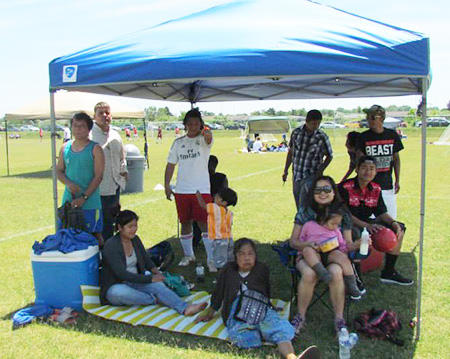Stories of Change

Participants and spectators at the Kentucky Refugee Ministries World Cup tournament Photo: Asmir Terzic
CWS has 26 local affiliate refugee resettlement offices in its 21-state network.
Source: CWS Annual Report 2014
Refugee World Cup
It was a muggy Saturday morning. One of those mornings when most people would stay inside of their own home, enjoying breakfast with the air conditioning firmly set on cool. However, the situation was a bit different at the Collegiate Soccer Complex in Louisville, Ky. Sixteen teams were set to kick off the second annual Kentucky Refugee Ministries World Cup tournament. Hundreds of players, many former clients of Kentucky Refugee Ministries, assembled their own teams and flags, playing to represent their countries. There were teams from Somalia, Iraq, Burma, Bosnia and Cuba. Meskhetian Turks represented Turkey – and there were many more. American teams also participated, some representing the United States and some organized according to family heritage: Irish, Scottish, German and the like.
Walking around the fields, I listened to the enthusiastic speeches by captains, saw astute tactical formations by coaches, and observed anxious faces on some of the players. Participants as young as 16 and old as 60 lived a one-day dream of playing for their country in one of the biggest tournaments in Louisville.
I paused for a moment to take a photograph of the Burmese supporters who came to watch their team. I thought that some of the most interesting aspects of our lives are the things we take for granted, such as that Saturday’s humidity, the “potluck” of cultures present and a game of soccer. Each player on the field has his or her own unique story – a history of a lost home, survival and hope found in a new country. I didn’t expect that soccer would solve their everyday problems – but it could them think about the joy that one day could bring.
The tournament also served as a fundraiser for the KRM United, a soccer program run by Kentucky Refugee Ministries, CWS’s refugee resettlement affiliate in Louisville. Most of the teams were financially sponsored by churches, community leaders or local businesses. The soccer fields were also graciously donated by the Collegiate High School. The Louisville Soccer Alliance, a youth soccer club, helped with lining the four fields and a number of dedicated volunteers made the tournament a complete success. In the championship game, the Somali Bantu won 1-0 over Iraq and lifted a trophy as the tournament winners.
Since Louisville is increasingly becoming a multicultural city, one of the tools that can be used to overcome the barriers to social transformation is the game of soccer. I believe that the KRM World Cup tournament succeeded in doing just that. It promoted diversity, friendships and a fierce but friendly competition. The success of the tournament can be best measured in increased interest and questions that I’ve received from players and coaches.
The main comment was, “When is the next tournament? We can’t wait to play again.”
Storyteller: Asmir Terzic, United States
